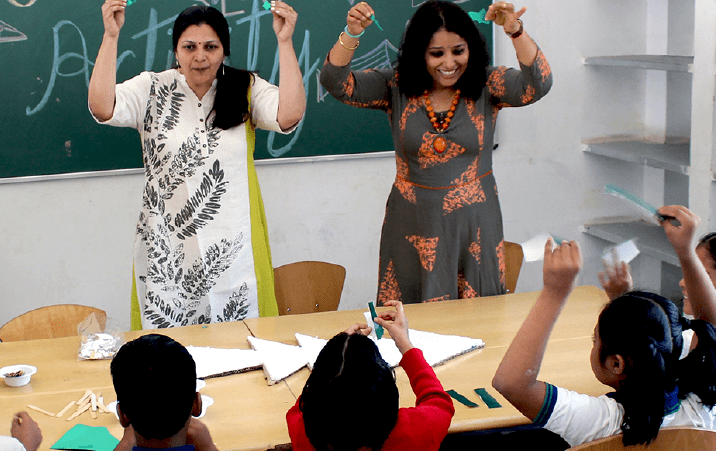Five years ago when Kanta Bhardwaj, a 33-year-old resident of Hamidpur, was told that her son would never be on par with other children, she said she left the hospital feeling “hopeless.” Her eleven-year-old was diagnosed with cerebral palsy. While Bhardwaj tried to teach him alphabets and numbers in the subsequent years, she said it has been challenging for them.
“Earlier this year, the state education department reached out to us to enrol our child for their home-based education plan. Interacting with the resource person has helped us in many ways. The teacher shared resource material that keeps our child engaged and also spoke to us about how we can teach him or interact with him,” she said.
Last year, the directorate of education’s (DoE) inclusive education branch rolled out a home-based education plan for 251 of the 649 children with special needs, who are not enrolled in formal schooling due to their disability or other reasons. The department allotted resource persons to each child and was responsible for screening the children for 21 disabilities as given in the Rights of Persons with Disabilities (RPWD) Act, 2016. The special educators also conducted skill-based and academic assessments to develop individualized education plan as per the needs and requirements of the children between January-February this year.
Following a fresh round of survey that is set to end this month, the department is now planning to extend the programme to all out-of-school children with special needs so that those who cannot come to school can continue home-based education.
A senior official in the inclusive education branch of the education department said it is the first time that the department has rolled out such a plan. “The idea is to help these children learn basic tasks and routine activities such as brushing, eating, wearing clothes, and using washroom, and then focus on basic reading and writing. The concerned resource persons will also help enrol these children in government or open schools based on their learning levels and upon completion of the intervention. We also plan to help these children learn some skills or vocation if they express the desire and inclination to do so.”
While the resource persons are expected to do fortnightly visits to these families, parents HT spoke to said that the lockdown impacted the process.
Saurabh Kumar (18), a resident of Amrit Vihar in Burari, said the resource person assigned to his 15-year-old sister, who has celebral palsy, paid only a few visits since January due to the second wave of Covid-19 but kept in touch with the family through calls and text messages.
“My sister has attended school only till the age of nine. When she started getting fits more frequently, the private school she was enrolled in said they could no longer handle it. I tried teaching her but she was easily irritable and refused to learn. The resource person we were assigned in January this year shared a list of activities that we could do with her,” said Kumar.
The department has been handing out flashcards to identify fruits, vegetables, and modes of transport, therapeutic clay, and spongy balls to improve fine-motor skills, picture books and colouring books to improve visual sense, and even different textures of cloth or paper to improve their tactile sense under the programme.
Bharat Bhushan, who has been the point-person for five such children in the north district, said, “Each child is different and so they require a specialised learning plan. We have children suffering from intellectual disability to cerebral palsy to quadriplegia or monoplegia. These children mostly come from families where there isn’t much awareness of the different disabilities.”
“We also help the family understand how they need to approach daily tasks, do exercises with children to improve their muscles and speech exercises to improve their communication,” said Bharat.
Family members of children with special needs enrolled in the home-education plan said the intervention has led to minor changes in their wards in the past few months. “Due to cerebral palsy, my sister’s body is weak and she cannot walk easily. That has changed. Now, she is motivated to get out of bed and do tasks assigned to her for the day. She can now identify colours, can speak more clearly, and can wear clothes with little help,” said Kumar.
Bhardwaj too cited the same. “My son now takes interest in activities. I am now teaching him how to form sentences while speaking. This gives us hope because our child loves to play and do all the naughty things that any 11-year-old does. I will do everything we are asked to if it improves my child’s life,” she said.
However, Anita Ghai, dean of School of Human Studies at Ambedkar University and a disability rights activist, said home-based learning plans could only work if they are done in a blended mode. “Limiting these children to home will restrict their development of the self. Even if the severity of certain disabilities does not allow children to come out of their homes and learn, a module has to be developed where there is some element of interaction with the society to ensure that disability is understood in an epistemological way. If my parents had kept me in the house, I would not have reached where I am today.”
Courtesy – Hindustan Times
